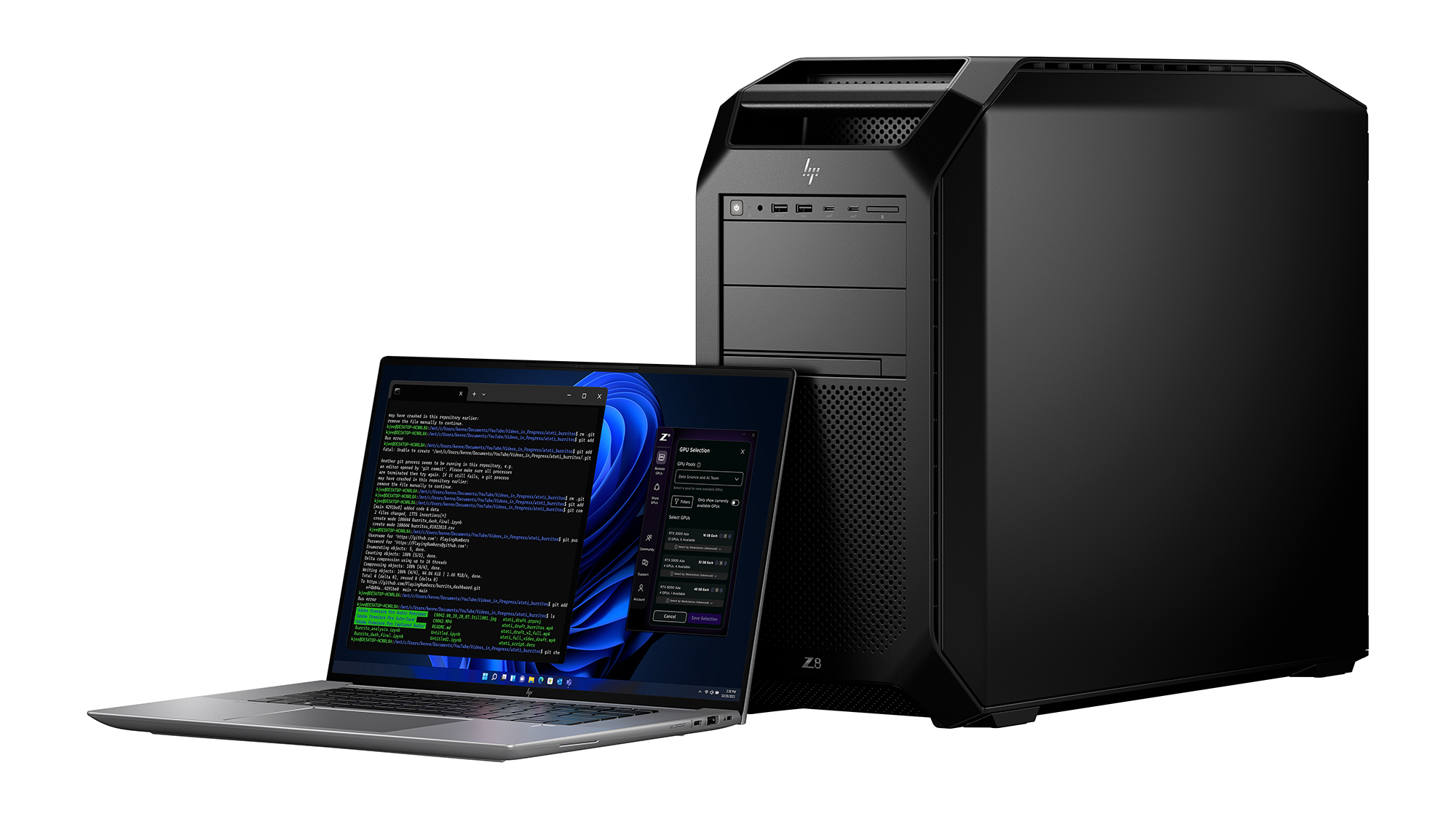Sponsored by HP
No limits: Data-driven insights for your future success, now
Taking advantage of data in the AI age necessitates the right hardware that will let you derive insights quicker and more efficiently than ever before

The enterprise is awash with so much data in today's landscape that it is becoming increasingly difficult to know how to begin making the most of it, and how to do so efficiently.
Many experts have predicted that by 2025 there will be an exponential rise in the amount of enterprise data – but the rise of artificial intelligence (AI) has also added a new dimension to how that data manifests and how businesses can use it.
Tom Sadler, HP UK and Ireland’s AI and Data Science Solution lead explains: “The sheer scale of data that enterprises handle today has transformed decision-making. Looking to the workplace of tomorrow, on-device AI tools, powered by cutting-edge workstations, are key to turning this data into actionable insights faster than ever before. These technologies empower organizations to not only keep pace but also to innovate ahead of their competition.”
One of the key trends expected next year is the universality of automated insights derived from data through large language models (LLMs) and similar advanced AI systems, according to Forbes.
With the likes of ChatGPT lowering the barrier to entry, now more than just the most technically proficient data scientists can query complex data sets for insights. With that in mind, turning data into insights quicker than the competition will be the deciding factor in getting ahead in any particular industry. This is why equipping the workforce with the best possible tools – including cutting-edge workstations designed to churn through AI workloads combined with the best-in-class software – is essential to gaining an edge in 2025 and beyond.
Big data in the AI age
Once data is sourced from various places, including existing databases, historical sources, e-commerce tools, social media channels, and customer conversations, among other areas, it needs to be processed.
This standardization is essential as it means various data pieces can be changed to a common format used by different tools. Here, AI-powered software is usually deployed to dive into the data to derive patterns or trends that can feed into better decisions.
These insights inform the thinking of human decision-makers who can pick out findings from a larger pool – and ultimately decide which actions to take to make concrete improvements.
"The ability to standardize and process data effectively is the backbone of any successful AI strategy," explains Sadler. "However, it’s not just about cleaning and organizing data. It’s about leveraging powerful AI tools and hardware to uncover trends that may not be immediately obvious and turning those into actionable insights."
There were far more barriers and technical requirements when the notion of big data first captured the imagination of enterprises. Recent advancements in technology, however, have lowered the barriers to the extent that more and more employees across an organization can view, interact with, and query data streams.
This is data democratization in action. Now businesses can rethink the way they consume, store, share, and reuse data so that more employees can access it, and make better-informed decisions based on their intent to query the data and process it.
Unlocking access to information that was previously stored in a data lake or warehouse, where only IT staff could previously access it, is one great example of data democratization. Another example is devising modern strategies to help connect new and varying data sources. Such shifts empower workers to make the most of new information streams and generate fresh insights. While much progress has been made, studies show that there is still plenty of work to be done to move from theory to reality when it comes to data democratization.
"At HP, we’ve seen first-hand how empowering teams with tools like Z by HP workstations or AI Studio can transform data into a competitive advantage," Sadler adds.
"It’s about enabling every employee to work smarter and faster, breaking down silos, and unlocking true organizational potential."
Although the majority (90%) of decision-makers believe data utilization is an important part of their organization's digital transformation efforts, just 44% say data use is a priority in day-to-day operations, according to research by Opendatasoft.
Staggeringly, 13% say their employer is a data leader. Further findings suggest that 66% of decision-makers believe it's quick and easy to access data they need – while half surveyed (50%) agree that accessing data requires specific skills or the need to speak with an expert analyst (48%). The same percentage suggests there's a gap between an organization's ambition to do more with data as well as the actual position that's reflected in the organization's actions.
Sign up today and you will receive a free copy of our Future Focus 2025 report - the leading guidance on AI, cybersecurity and other IT challenges as per 700+ senior executives
ITPro is a global business technology website providing the latest news, analysis, and business insight for IT decision-makers. Whether it's cyber security, cloud computing, IT infrastructure, or business strategy, we aim to equip leaders with the data they need to make informed IT investments.
For regular updates delivered to your inbox and social feeds, be sure to sign up to our daily newsletter and follow on us LinkedIn and Twitter.
-
 Mistral CEO Arthur Mensch thinks 50% of SaaS solutions could be supplanted by AI
Mistral CEO Arthur Mensch thinks 50% of SaaS solutions could be supplanted by AINews Mensch’s comments come amidst rising concerns about the impact of AI on traditional software
-
 Westcon-Comstor and UiPath forge closer ties in EU growth drive
Westcon-Comstor and UiPath forge closer ties in EU growth driveNews The duo have announced a new pan-European distribution deal to drive services-led AI automation growth
-
 ‘AI is no longer about experiments. It is about results’: Boards are pushing for faster returns on AI investments, and tech leaders can't keep pace
‘AI is no longer about experiments. It is about results’: Boards are pushing for faster returns on AI investments, and tech leaders can't keep paceNews AI projects are now being held to the same standards as any other business investment
-
 AI isn’t making work easier, it’s intensifying it – researchers say teams are now facing 'unsustainable' workloads, cognitive strain, and higher levels of burnout
AI isn’t making work easier, it’s intensifying it – researchers say teams are now facing 'unsustainable' workloads, cognitive strain, and higher levels of burnoutNews While workers report productivity gains with AI, that means they’re faced with bigger workloads
-
 Business leaders are using AI as a “license to reduce headcount” – new Morgan Stanley research lays bare the impact on UK workers
Business leaders are using AI as a “license to reduce headcount” – new Morgan Stanley research lays bare the impact on UK workersNews Analysis of five sectors highlights an "early warning sign" of AI’s impact on jobs
-
 Lloyds Banking Group wants to train every employee in AI by the end of this year – here's how it plans to do it
Lloyds Banking Group wants to train every employee in AI by the end of this year – here's how it plans to do itNews The new AI Academy from Lloyds Banking Group looks to upskill staff, drive AI use, and improve customer service
-
 CEOs are fed up with poor returns on investment from AI: Enterprises are struggling to even 'move beyond pilots' and 56% say the technology has delivered zero cost or revenue improvements
CEOs are fed up with poor returns on investment from AI: Enterprises are struggling to even 'move beyond pilots' and 56% say the technology has delivered zero cost or revenue improvementsNews Most CEOs say they're struggling to turn AI investment into tangible returns and failing to move beyond exploratory projects
-
 Companies continue to splash out on AI, despite disillusionment with the technology
Companies continue to splash out on AI, despite disillusionment with the technologyNews Worldwide spending on AI will hit $2.5 trillion in 2026, according to Gartner, despite IT leaders wallowing in the "Trough of Disillusionment" – and spending will surge again next year.
-
 A new study claims AI will destroy 10.4 million roles in the US by 2030, more than the number of jobs lost in the Great Recession – but analysts still insist there won’t be a ‘jobs apocalypse’
A new study claims AI will destroy 10.4 million roles in the US by 2030, more than the number of jobs lost in the Great Recession – but analysts still insist there won’t be a ‘jobs apocalypse’News A frantic push to automate roles with AI could come back to haunt many enterprises, according to Forrester
-
 Businesses aren't laying off staff because of AI, they're using it as an excuse to distract from 'weak demand or excessive hiring'
Businesses aren't laying off staff because of AI, they're using it as an excuse to distract from 'weak demand or excessive hiring'News It's sexier to say AI caused redundancies than it is to admit the economy is bad or overhiring has happened

